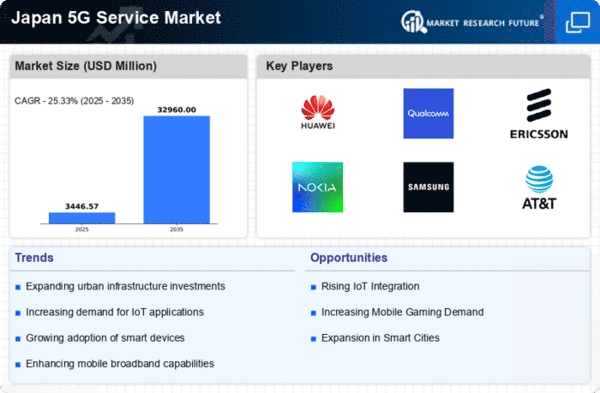Emergence of New Business Models
The 5G Service Market in Japan is witnessing the emergence of new business models that leverage the capabilities of 5g technology. Companies are exploring innovative approaches to service delivery, such as subscription-based models and pay-per-use services. These models are designed to cater to the diverse needs of consumers and businesses, providing flexibility and scalability. For instance, industries such as healthcare and manufacturing are beginning to adopt 5g solutions for real-time data analytics and remote monitoring, which could enhance operational efficiency. This shift towards new business models is likely to stimulate growth in the 5g service market, as organizations seek to capitalize on the advantages offered by advanced connectivity.
Government Initiatives and Support
The Japanese government plays a crucial role in fostering the 5G Service Market through various initiatives and support mechanisms. Policies aimed at promoting digital transformation and technological advancement are being implemented, which include substantial investments in telecommunications infrastructure. The government has allocated approximately $2 billion to enhance 5g network deployment across urban and rural areas. This commitment is expected to facilitate widespread access to 5g services, thereby encouraging adoption among businesses and consumers alike. Furthermore, public-private partnerships are being encouraged to accelerate the rollout of 5g technology, which is likely to create a more competitive landscape in the 5g service market.
Rising Demand for High-Speed Connectivity
The 5G Service Market in Japan is experiencing a notable surge in demand for high-speed connectivity. As consumers increasingly rely on mobile devices for various applications, the need for faster data transmission becomes paramount. Reports indicate that mobile data traffic in Japan is projected to grow at a CAGR of approximately 30% through 2025. This growth is driven by the proliferation of streaming services, online gaming, and remote work solutions. Consequently, telecommunications providers are investing heavily in infrastructure to meet this demand, thereby propelling the 5g service market forward. Enhanced connectivity not only improves user experience but also supports the development of innovative applications, further stimulating market growth.
Growth of Mobile Applications and Services
The proliferation of mobile applications and services is significantly impacting the 5G Service Market in Japan. As developers create more sophisticated applications that require high-speed internet, the demand for 5g connectivity is expected to rise. For instance, applications related to augmented reality (AR) and virtual reality (VR) are gaining traction, with the market for AR/VR expected to reach $10 billion by 2026. This trend indicates a shift towards more data-intensive applications, which can only be effectively supported by 5g technology. Consequently, the growth of mobile applications is likely to drive the expansion of the 5g service market, as users seek faster and more reliable connections to access these services.
Increased Investment in Telecommunications Infrastructure
Investment in telecommunications infrastructure is a critical driver of the 5G Service Market in Japan. Major telecom operators are committing substantial resources to upgrade existing networks and build new 5g infrastructure. Reports suggest that total investment in 5g infrastructure could exceed $20 billion by 2025. This influx of capital is aimed at enhancing network capacity and coverage, which is essential for meeting the growing demand for high-speed mobile services. As infrastructure improves, the quality of service is expected to rise, attracting more users to 5g offerings. This investment trend is likely to create a robust ecosystem for the 5g service market, fostering innovation and competition among service providers.
















